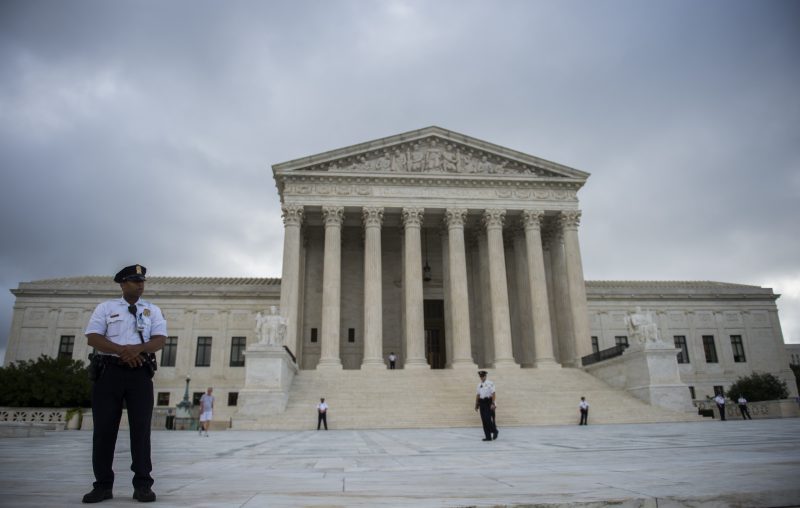Top US court to study case of black man tried six times for same crime
The US Supreme Court will examine the case of an African-American man tried six separate times for the same crime, in a case driven by a white prosecutor who has been accused of trying to keep black people off the jury (ANDREW CABALLERO-REYNOLDS)
Washington (AFP) – The US Supreme Court will begin Wednesday to examine the case of a black man who was tried six separate times for the same crime — which he insists he didn’t commit — in a process tarnished by charges of racism.
The country’s top court will not pronounce on the guilt of Curtis Flowers, a 48-year-old man who has spent almost half his life behind bars, nor on the relentless push to secure his conviction.
Instead, the court will be looking into whether the prosecutor in charge of the case deliberately worked to keep black people off the jury during Flowers’ most recent trial in 2010, in which he was sentenced to death.
“Curtis Flowers was always tried by an all-white jury or a nearly all-white jury, even though the place where the murders happened and where he lived was nearly 50 percent African-American,” said Madeleine Baran, a journalist who reported on the case in her podcast “Into the Dark.”
Together with a radio colleague from American Public Media, she spent a year in Winona, Mississippi, where the case began on July 16, 1996 with the cold-blooded murder of four people in a furniture shop.
In that southern state, with a history of slavery and segregation, “I met only one white person who thought that Curtis Flowers was innocent,” she told AFP.
By contrast, “the vast majority” of African-Americans thought Flowers was either innocent or that the case itself was flawed.
Flowers had briefly worked in the furniture store before the shooting occurred, and was arrested in January 1997 after two witnesses placed him near the scene of the crime.
Since then he has been tried for the murders a total of six times — in 1997, 1999, 2004, 2007, 2008 and finally in 2010 — each time maintaining his innocence.
“Certainly to be tried six times is unusual,” said Baran, who investigated precedents and found only one other such case, of someone tried nine times for the same crime.
US law forbids suspects being judged for the same crime twice, but Flowers faced the legal ordeal because he was never actually acquitted.
He was convicted at his first three trials but the verdicts were overturned by the state Supreme Court for prosecutorial misconduct. Those cases were followed by two more trials which resulted in a hung jury.
– Absence of prosecutorial restraint –
Alerted to Flowers’ story by a listener, Baran became fascinated by the case because it highlighted the lack of constraints governing the behavior of prosecutors in the 50 US states.
In Flowers’ case, a single district attorney, Doug Evans, who is white, steered all the prosecutions during the six trials. Elected by the citizens of his district in 1991, he can only ever be removed from his job if he loses an election.
Yet the first three trials against Flowers were thrown out because of Evans’ errors. Specifically in the third case the Mississippi Supreme Court ruled that he had discriminated against black jurors.
Baran and her colleagues examined other cases he had prosecuted in his long career, analyzing jury rosters and rejections of potential jurors.
According to their research, Doug Evans used his power to reject would-be jurors 4.5 times as often with African-Americans as with white people.
Those findings will be presented when the US Supreme Court deliberates on the case.
“Doug Evans knows that there are a lot of problems with that case. That’s why he strikes black jurors,” said Ray Charles Carter, who defended Flowers in his last four trials.
“Black folks are more suspicious, because we have seen abuses in our family,” he said. “We have been victims too often.”
The Supreme Court in Washington is expected to render its decision by June this year, but Baran said that even if it rules in Flowers’ favor, it will only highlight the problem rather than remedy it.
“Still Curtis could be tried again by the same prosecutor and the prosecutor could attempt the same thing again,” she said.
Flowers’ defense lawyer said “Evans believes he has to win this case… that a loss in this case would harm his legacy and standing in the community.”
Disclaimer: This story is published from a syndicated feed. Siliconeer does not assume any liability for the above story. Validity of the above story is for 7 Days from original date of publishing. Content copyright AFP.


